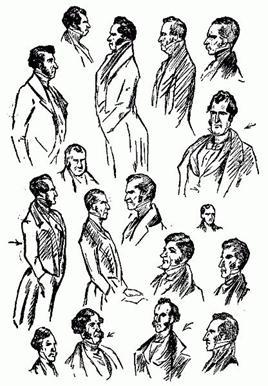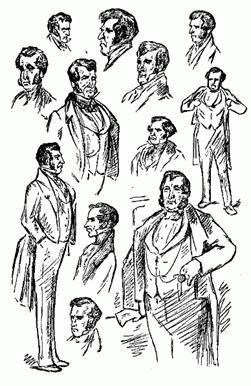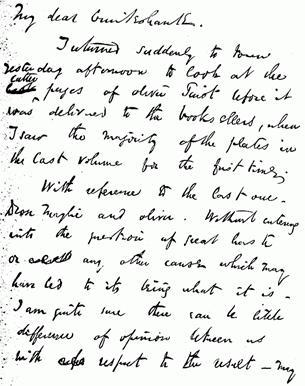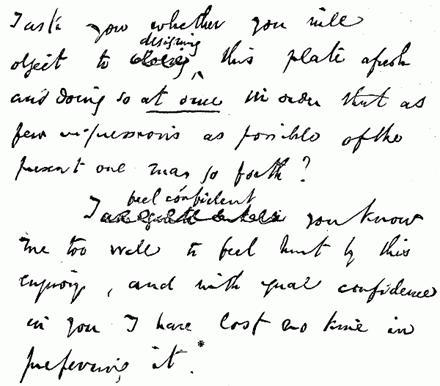Complete Works of Wilkie Collins (2302 page)
Read Complete Works of Wilkie Collins Online
Authors: Wilkie Collins



Several letters now expressed his anxiety and care about the illustrations. A nervous dread of caricature in the face of his merchant-hero, had led him to indicate by a living person the type of city-gentleman he would have had the artist select; and this is all he meant by his reiterated urgent request, “I do wish he could get a glimpse of A, for he is the very Dombey.” But as the glimpse of A was not to be had, it was resolved to send for selection by himself glimpses of other letters of the alphabet, actual heads as well as fanciful ones; and the sheetful I sent out, which he returned when the choice was made, I here reproduce in fac-simile. In itself amusing, it has now the important use of showing, once for all, in regard to Dickens’s intercourse with his artists, that they certainly had not an easy time with him; that, even beyond what is ordinary between author and illustrator, his requirements were exacting; that he was apt, as he has said himself, to build up temples in his mind not always makeable with hands; that in the results he had rarely anything but disappointment; and that of all notions to connect with him the most preposterous would be that which directly reversed these relations, and depicted him as receiving from any artist the inspiration he was always vainly striving to give. An assertion of this kind was contradicted in my first volume; but it has since been repeated so explicitly, that to prevent any possible misconstruction from a silence I would fain have persisted in, the distasteful subject is again reluctantly introduced.


It originated with a literary friend of the excellent artist by whom
Oliver Twist
was illustrated from month to month, during the earlier part of its monthly issue. This gentleman stated, in a paper written and published in America, that Mr. Cruikshank, by executing the plates before opportunity was afforded him of seeing the letter press, had suggested to the writer the finest effects in his story; and to this, opposing my clear recollection of all the time the tale was in progress, it became my duty to say that within my own personal knowledge the alleged fact was not true. “Dickens,” the artist is reported an saying to his admirer, “ferreted out that bundle of drawings, and when he came to the one which represents Fagin in the cell, he silently studied it for half an hour, and told me he was tempted to change the whole plot of his story. . . . I consented to let him write up to my designs; and that was the way in which Fagin, Sikes, and Nancy were created.” Happily I was able to add the complete refutation of this folly by producing a letter of Dickens written at the time, which proved incontestably that the closing illustrations, including the two specially named in support of the preposterous charge, Sikes and his Dog, and Fagin in his Cell, had not even been seen by Dickens until his finished book was on the eve of appearance. As however the distinguished artist, notwithstanding the refreshment of his memory by this letter, has permitted himself again to endorse the statement of his friend, I can only again print, on the same page which contains the strange language used by him, the words with which Dickens himself repels its imputation on his memory. To some it may be more satisfactory if I print the latter in fac-simile; and so leave for ever a charge in itself so incredible that nothing would have justified farther allusion to it but the knowledge of my friend’s old and true regard for Mr. Cruikshank, of which evidence will shortly appear, and my own respect for an original genius well able to subsist of itself without taking what belongs to others.


Resuming the
Dombey
letters I find him on the 30th of August in better heart about his illustrator. “I shall gladly acquiesce in whatever more changes or omissions you propose. Browne seems to be getting on well. . . . He will have a good subject in Paul’s christening. Mr. of it. The little chapter of Miss Tox and the Major, which you alas! (but quite wisely) rejected from the first number, I have altered for the last of the second. I have not quite finished the middle chapter yet — having, I should say, three good days’ work to do at it; but I hope it will be all a worthy successor to number one. I will send it as soon as finished.” Then, a little later: “Browne is certainly interesting himself, and taking pains. I think the cover very good: perhaps with a little too much in it, but that is an ungrateful objection.” The second week of September brought me the finished MS. of number two; and his letter of the 3rd of October, noticing objections taken to it, gives additional touches to this picture of him while at work. The matter that engages him is one of his masterpieces. There is nothing in all his writings more perfect, for what it shows of his best qualities, than the life and death of Paul Dombey. The comedy is admirable; nothing strained, everything hearty and wholesome in the laughter and fun; all who contribute to the mirth, Doctor Blimber and his pupils, Mr. Toots, the Chicks and the Toodles, Miss Tox and the Major, Paul and Mrs. Pipchin, up to his highest mark; and the serious scenes never falling short of it, from the death of Paul’s mother in the first number, to that of Paul himself in the fifth, which, as a writer of genius with hardly exaggeration said, threw a whole nation into mourning. But see how eagerly this fine writer takes every suggestion, how little of self-esteem and self-sufficiency there is, with what a consciousness of the tendency of his humour to exuberance he surrenders what is needful to restrain it, and of what small account to him is any special piece of work in his care and his considerateness for the general design. I think of Ben Jonson’s experience of the greatest of all writers. “He was indeed honest, and of an open and free nature; had an excellent phantasy, brave notions and gentle expressions; wherein he flowed with that facility, that sometimes it was necessary he should be stopped.” Who it was that stopped
him
, and the ease of doing it, no one will doubt. Whether he, as well as the writer of later time, might not with more advantage have been left alone, will be the only question.
Thus ran the letter of the 3rd of October: “Miss Tox’s colony I will smash. Walter’s allusion to Carker (would you take it
all
out?) shall be dele’d. Of course, you understand the man! I turned that speech over in my mind; but I thought it natural that a boy should run on, with such a subject, under the circumstances: having the matter so presented to him. . . . I thought of the possibility of malice on christening points of faith, and put the drag on as I wrote. Where would you make the insertion, and to what effect?
That
shall be done too. I want you to think the number sufficiently good stoutly to back up the first. It occurs to me — might not your doubt about the christening be a reason for not making the ceremony the subject of an illustration? Just turn this over. Again: if I could do it (I shall have leisure to consider the possibility before I begin), do you think it would be advisable to make number three a kind of half-way house between Paul’s infancy, and his being eight or nine years old? — In that case I should probably not kill him until the fifth number. Do you think the people so likely to be pleased with Florence, and Walter, as to relish another number of them at their present age? Otherwise, Walter will be two or three and twenty, straightway. I wish you would think of this. . . . I am sure you are right about the christening. It shall be artfully and easily amended. . . . Eh?”
Meanwhile, two days before this letter, his first number had been launched with a sale that transcended his hopes and brought back
Nickleby
days. The
Dombey
success “is brilliant!” he wrote to me on the 11th. “I had put before me thirty thousand as the limit of the most extreme success, saying that if we should reach that, I should be more than satisfied and more than happy; you will judge how happy I am! I read the second number here last night to the most prodigious and uproarious delight of the circle. I never saw or heard people laugh so. You will allow me to observe that my reading of the Major has merit.” What a valley of the shadow he had just been passing, in his journey through his Christmas book, has before been told; but always, and with only too much eagerness, he sprang up under pressure. “A week of perfect idleness,” he wrote to me on the 26th, “has brought me round again — idleness so rusting and devouring, so complete and unbroken, that I am quite glad to write the heading of the first chapter of number three to-day. I shall be slow at first, I fear, in consequence of that change of the plan. But I allow myself nearly three weeks for the number; designing, at present, to start for Paris on the 16th of November. Full particulars in future bills. Just going to bed. I think I can make a good effect, on the after story, of the feeling created by the additional number before Paul’s death.” . . . Five more days confirmed him in this hope. “I am at work at
Dombey
with good speed, thank God. All well here. Country stupendously beautiful. Mountains covered with snow. Rich, crisp weather.” There was one drawback. The second number had gone out to him, and the illustrations he found to be so “dreadfully bad” that they made him “curl his legs up.” They made him also more than usually anxious in regard to a special illustration on which he set much store, for the part he had in hand.